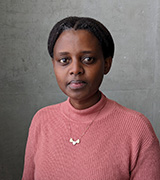Global Health Disparities: What Can We Learn from the Genocide Against the Tutsi People?

Interviewed by Sorcha McNally, BHSc Student, Faculty of Health Sciences
May 19, 2022
 Dr. Glorieuse Uwizeye
Dr. Glorieuse Uwizeye
Dr. Glorieuse Uwizeye is an Assistant Professor at The Western University of Ontario in London, Ontario, Canada. Dr. Uwizeye's interdisciplinary research program expands the current understanding of intergenerational health effects of exposure to socio-political and racial violence. She studies health impacts of genocide against the Tutsi and epigenetic mechanisms linking prenatal exposure to genocide or genocidal rape and adulthood health outcomes. Through this research program, she hopes to generate findings of interest to nurses and other professionals interested in addressing health inequality.
Sorcha: You are new at Western this year. It's great to have another Global Health Equity concerned member of the Western community. Could I start by asking you to share a little about your main research interests and current research?
Glorieuse: I have a broad research interest because I conduct interdisciplinary research that expands on the current understanding of intergenerational effects of exposure to social, political and racial violence. In most cases, the harm to individuals through direct violence is preceded by social structural violence. I am particularly interested in the intergenerational health impacts - mental and physical - of genocide among Rwandans conceived during the 1994 genocide against the Tutsi. I look at prenatal exposure to genocide or genocidal rape and postnatal experience—adverse childhood experience (ACEs). This includes various form of child abuse, both physical and emotional, or other adverse outcomes resulting from genocide or the aftermath period. Finally, I am interested in epigenetics—a non-sequence-based information that determines whether or not a gene is expressed, through the physical modification of the DNA molecule itself, as there is evidence of epigenetic mechanisms linking prenatal and early life trauma exposure to health outcomes. Currently, we are conducting an epigenome-wide association study to evaluate whether there are potential epigenetic mechanisms linking prenatal exposure to genocide and genocidal rape with mental and physical outcomes among Rwanda adults conceived during the 100 days of the genocide against Tutsi.
I do have a more general interest in global health disparities. The globe is becoming a more and more connected place, and what is appearing in one setting affects other parts of the world. In Canada, we have immigrants from across the world. As nurses, it is important that we understand not only their health conditions but also recognize what shapes them. We have the power to expand our intervention beyond our communities/countries, but also to learn best practices from others across the globe. As a health proficiency, there is an interest in looking at health in terms of global health. As a nurse, I am interested in how we can best educate enough nurses to take on the work that needs to be done to promote health equity around the globe.
Sorcha: Your main research is on intergenerational health impacts of genocide. Could you share a bit more about that research?
My research focuses on the impacts of prenatal exposure to the genocide against the Tutsi. I focus on young adults that were conceived in the period of the genocide against the Tutsi. There are in three groups; 1) individuals born of genocidal rape (prenatally exposed to genocide and genocidal rape); 2) individuals born of genocide survivors not raped. The final group- control group is individuals born of Rwandan women with neither exposure who left Rwanda before the genocide and returned afterwards. I collected a range of adult mental and physical health outcomes using surveys, including Adverse Childhood Experiences International Questionnaire (ACE-IQ) and other instruments to measure adult mental and physical health characteristics. Whole dried blood spots (DBS) were also collected for DNA methylation (DNAm) analysis to evaluate the relationships between prenatal exposure to genocide and measured health outcomes
Sorcha: What drew you to ask these questions/explore these issues?
Glorieuse: I was in Rwanda during the time of the genocide against the Tutsi. As a high school student, I was old enough to observe life before the genocide and see how hard life was for the Tutsi. At that time, nurses were trained at the high school level. After the genocide, I went back to school to complete my nursing program. When I finished, the country was in need of mental health nurses, and I pursued this path. Once I completed the program I worked mainly in the community.
My interest came from my personal experience and the need to contribute to improving the lives of survivors because I knew what it means to be a survivor. In my research, I have felt the need to document the lived experience of survivors, using my writing as a way of advocating for them. I began conducting interviews and found that there was a need for care for children born via genocidal rape as they were seen, by some, as a child of a perpetrator which limited access to care and support, they would get. I found that these women, in addition to being raped and surviving a genocide, they also have to take care of their children with limited support. Because of this, I shifted my focus from mothers to children born of genocidal rape while still advocating for their mothers. I interviewed these children to understand their lived experience from their own perspective, a perspective that has been given limited attention. It is this work that informed my work on health outcomes of exposure of adverse experiences in early life (both pre and postnatal). There is evident that adverse experience during the early stages of life has serious implications on one’s health and those effects can be transmitted to the next generation. I look at epigenetics as they are thought to be the mechanisms that potentially link prenatal exposure to health outcomes. I plan to continue building on this research by working with these young adults as they age and start families of their own, to better understand how their early life experiences affect future generations.
Sorcha: Why is it important, in your view, for Nursing students and healthcare practitioners more generally to think about these issues?
Glorieuse: Through my clinical work among survivors of genocide, it became apparent that my patients needed more than just mental health care; there were other social determinants of health that needed to be addressed. As health professionals, we need to understand where illnesses are stemming from. If we are to provide effective care, we need to evaluate the possible risk as well as protective factors that contribute to health of people we care for. This approach can also lead to prevention, mitigation interventions and overall, better treatment. For example, if you are providing care for an individual with Posttraumatic stress disorder (PTSD), you need to understand their lived experience as well as their current life to understand the range of factors contributing to their health condition. In the past, there was less attention to social determinants, where people live, work, study, and what could affect an individual’s health. As a nurse, you need to have that understanding that we are well positioned to contribute to efforts to address social determinants of health and this improves the health outcomes of those disadvantaged in any way.
Sorcha: In what ways does such work connect to questions of equity?
Glorieuse: I look specifically at Rwanda but if we are all committed to ensuring health equity around the globe and see it as a place where we all live, I believe the genocide against the Tutsi could have been prevented and thus we would not have to be dealing with the health outcomes of such experience. My work points to the need for national and international policies that identify risks of an impending genocide and other kinds of political and violence, and enact practices to prevent genocide and its health impacts. We can expand on our understanding of these health impacts of genocide to evaluate the contribution of the social determinants of health and how they result in health disparities around the world. If we are trying to achieve global equity, we need to address direct and indirect human violence, including social structures that create inequity. We need to recognize that all forms of violence lead to unfair and avoidable health conditions in the most disadvantaged people in different parts of the world. We need to learn from events like the Tutsi genocide and share knowledge to prevent future events. There are lessons to learn and interventions we can provide and work together to achieve global health equity.
